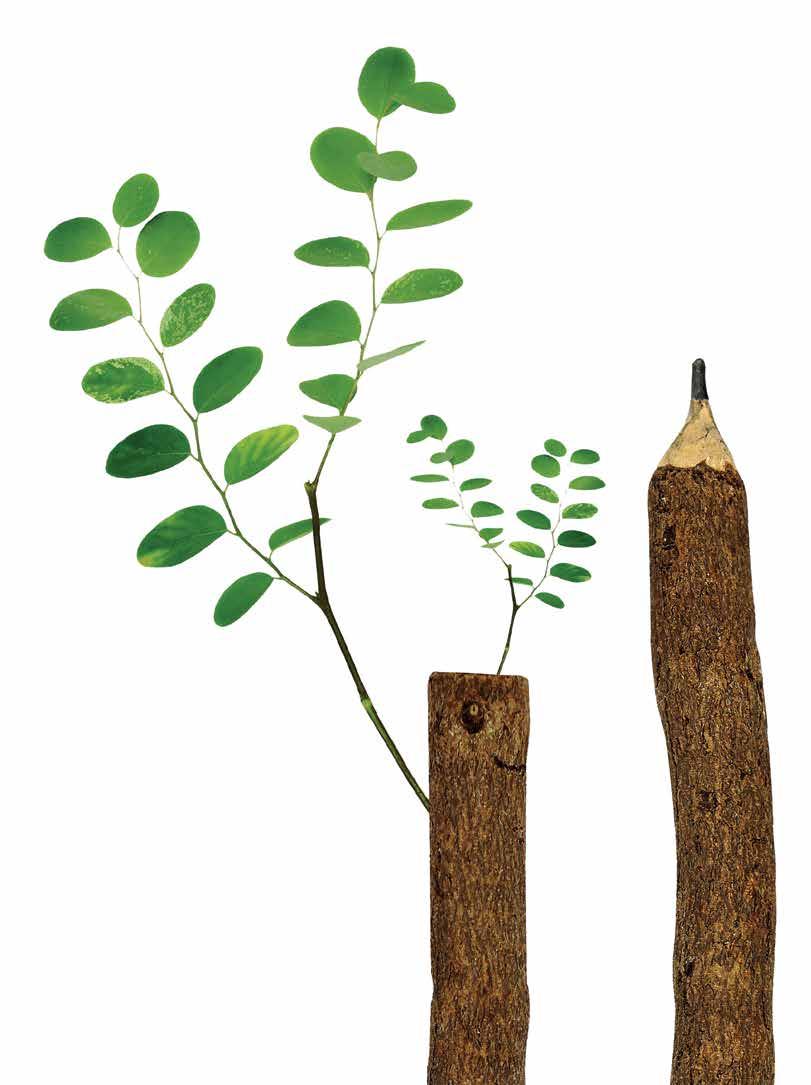
Editor in Chief: Fawaz Chawk
Creative Director: Omar Alhashemi
Editorial Secretary: Dr. Abdul M. Kamareddine
Layout: (OVISION)
Sydney:



Editor in Chief: Fawaz Chawk
Creative Director: Omar Alhashemi
Editorial Secretary: Dr. Abdul M. Kamareddine
Layout: (OVISION)
Sydney:

It is true that certain leaders possess a natural ability to inspire and guide others based on their experiences and present skills. However, have these leaders been trained, coached, and encouraged to harness the power of foresight in order to lead effectively through times of uncertainty?

Leaders, especially, ponder the future regularly, seeking insights to make informed decisions. The rapid changes in today’s world make envisioning and preparing for the future a challenging task.
Traditionally, leadership knowledge is founded on past and present experiences, which are then applied to shape future decisions. However, in this fast-paced era of uncertainty, leaders must develop new skills to envision and anticipate changes, crafting strategic plans with adaptable time horizons. A foresight mindset is key.
The ability to envision the future is not about predicting it precisely; instead, it involves anticipating potential changes through scenario planning. It’s about leveraging these changes strategically to achieve the organisation’s mission. Foresight should be seen as a combination of mindset and methodology – a futurist mind with systematic forwardthinking and strategic capacity.
It’s crucial to differentiate foresight from prediction:

• Foresight acknowledges the uncertainty of the future and prepares people to make decisions in various scenarios.
• Prediction aims to remove uncertainty by forecasting specific events and outcomes.
To develop an initial model of strategic foresight, follow these steps:
1- Gather information and data about the present and past to anticipate future scenarios.
2- Generate possible strategic options.
3- Analyse potential challenges and risks to make informed decisions in the present.
4- Evaluate how the vision aligns with the evolving nature of your organisation amid uncertainty.
The most powerful tool for this model is the mental model you and your team have built over time, understanding how the world operates around your organisation (Bennis & Nanus, 2007).
As a wise leader, you will engage in multiple discussions with C-suite executives and consultants who have thought deeply about the future of your organisation. During these discussions, a thorough analysis of the mental model is essential. While some aspects may require subjective judgment, it is possible to suggest pertinent questions that should be addressed. Here are some of them: Stakeholders and their interests: Identify the key stakeholders with vested interests in the future of your organisation. Consider what each stakeholder group would like to see happen and how their needs align with the organisation’s goals.
Performance indicators and
measurement: Determine the potential indicators of performance for your organisation and establish how they can be effectively measured. This will help you track progress and ensure alignment with strategic objectives. Consequences of maintaining the current path: Evaluate the implications of maintaining the status quo without making significant changes to adapt to uncertainty. Understand the risks and potential consequences of this approach.
Early warning signals:
Anticipate early warning signs that might indicate substantial changes in the external environment impacting the organisation. Identify key triggers that warrant attention and potential adjustments in strategy.
Course alteration and consequences: Explore potential actions that could alter the course of events for your organisation in the face of uncertainty. Analyse the potential consequences of these actions to make informed decisions.
Resource assessment: Assess the resources at your organisation’s disposal and those that can be obtained to respond effectively during uncertain times. Understand the limitations and opportunities associated with these resources.
Favourable futures for survival and success:
Consider the alternative possible futures for both your organisation
and its operating environments. Identify which scenarios are more likely to lead to favourable outcomes in terms of survival and success.
By addressing these crucial questions, you will be better equipped to navigate the complexities of uncertainty and plan for a more resilient and successful future for your organisation. Remember that foresight and strategic thinking are continuous processes, and it is essential to remain adaptable and open to reevaluating strategies as new information emerges.
In conclusion, leaders must challenge biases and assumptions about the future and integrate foresight into their organisation’s DNA to foster a futurist mindset. Adopting a systematic approach to foresight will enable wise decisions today, ensuring a robust and sustainable future for your organisation and future generations. Foresight empowers organisations to develop strategies adaptable to multiple futures, keeping them ahead of the competition. However, it requires stepping out of comfort zones and should be an ongoing practice rather than a one-time activity. Neglecting the future can severely impact your organisation’s strategic foundation.
Blank, W. (2021). The 108 Skills of Natural Born Leaders. USA: Amacom. Bennis, W. & Nanus, B. (2007). Leaders: Strategies for taking charge. NY: Collins.
While many leadership books portray role model leaders as supreme geniuses, inherently born with leadership skills and the ability to forge their destiny, The book 108 Skills of Natural Born Leaders argues that leadership is not an innate trait but a capacity present in everyone (Blank, 2021).Dr. Rawaa El Ayoubi Founding Director Aspire Leadership Network
The Islamic calendar (or Hijri calendar) is a lunar calendar. It contains 12 months that are based on the motion of the moon, and because 12 lunar months is 12 x 29.53=354.36 days, the Islamic calendar is consistently shorter (11 Days) than a solar year, and therefore it shifts with respect to the Gregorian calendar. The first day of Year One of the Islamic calendar was set as the first day of the Hijrah, the Prophet’s migration from Makkah to Madinah. The western convention in designating Islamic dates is thus by the abbreviation AH, which stands for the Latin Anno Hegirae, or ‘Year of the Hijrah’.
[Quran - 9.36] Surely the number of months with Allah is twelve months in Allah’s ordinance since the day when He created the heavens and the earth..
[Quran - 31:29] Seest thou not that Allah merges Night into Day and he merges Day into Night; that He has subjected the sun, and the moon (to his Law), each running its course for a term appointed; and that Allah is well-acquainted with all that ye do?
Each month starts when the lunar crescent is first seen after a new moon.
Although new moons may be calculated quite precisely, the actual visibility of the crescent is difficult to predict. It depends on factors such as
weather, the optical properties of the atmosphere, and the location of the observer. Therefore in some cases it may be difficult to give accurate information in advance about when a new month will start.
[Quran - 103: 1..3] By (the Token of) Time (through the ages),- Verily Man is in loss,Except such as have Faith, and do righteous deeds, and (join together) in the mutual teaching of Truth, and of Patience and Constancy.
Furthermore, in some areas Muslims depend on a local sighting of the moon, whereas in other areas a universal sighting is accepted. (i.e. if a new crescent is seen anywhere in the world it is accepted for communities the world over). Both are valid Islamic practices, but they may lead to different starting days for the months.
The most important dates in the Islamic calendar are:
• 1 Muharram (Islamic New Year)

• 10 Muharram (Day of `Ashura’)
• 27 Rajab (Israa’ and Mi’raj)
• 1 Ramadan (first day of the month of fasting)
• The last ten days of Ramadan, which include (Laylat Al-Qadr)
• 1 Shawwal (`Eid Al-Fitr)
• 8 – 10 Dhul-Hijjah (Hajj)
• 9 Dhul-Hijjah (Day of `Arafah)
• 10 Dhul-Hijjah (`Eid Al-Adha).
The dating of the Islamic calendar was introduced by the second caliph, `Umar ibn Al-Khattab, in 638 CE (16 AH) in an attempt to circumvent all the various conflicting dating systems used during his time.
After consulting his companions, he set the Hijrah—the immigration of the Prophet (peace and blessings be upon him) from Makkah to Madinah—as the most appropriate reference to the new Islamic era.
The Hijrah, historically speaking, is the central event of early Islam, the turning point in Islamic history that led to the foundation of the first Muslim state.
Source: www.islamicity.com - aboutislam.net - catstevens.com
• However, the dates of some of these events, such as that of Laylat Al-Qadr and the Prophet Muhammad’s journey of Israa’ and Mi`raj, have not been conclusively specified, and there has been some uncertainty about the exact date of the event.
• Four of the twelve months are sacred: Rajab, Muharram, DhulQi`dah, Dhul- Hijjah).
• In the pre-Islamic period, raids among the Arab tribes were forbidden and hunting was halted during these months.
Islam inherited and approved this practice.
• Fighting (killing) is prohibited during these sacred months except in self-defense.
• Since the Islamic calendar is lunar, its year is 10 or 11 days shorter than the Gregorian year. This means that Muslim months fall in different seasons.
• For example, Ramadan and Hajj can fall in the summer as well as in the winter. It takes about 33 years for the Islamic dates to rotate through the solar seasons.

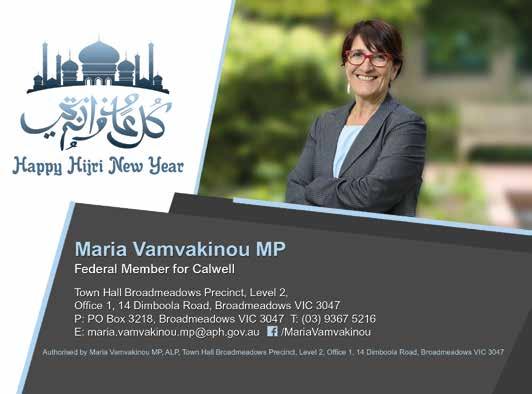
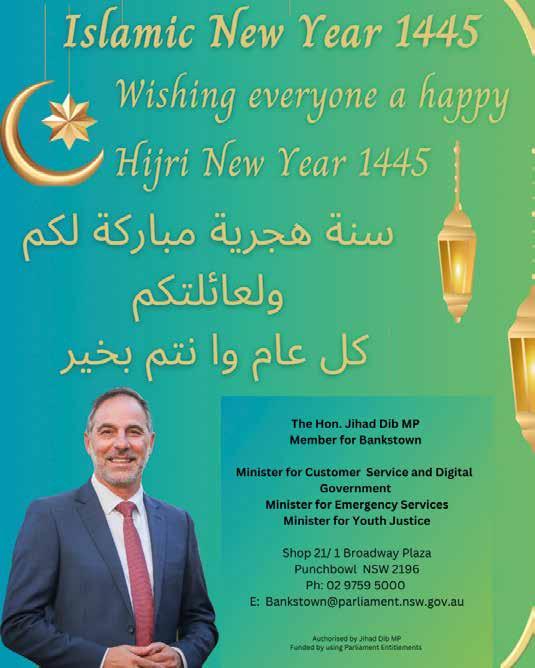
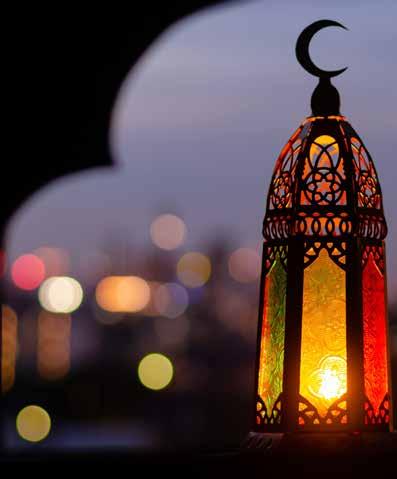
than we were in previous years but there is a lot more work to do insha’Allah.
We’re going inside the brain of the Team Leader at NZF to see what she has to say about Zakat in Australia. Allow me to briefly introduce you to our interviewee. Shahnaz is a selfconfessed coffee addict with a passion for supporting and serving the local Muslim community. She has a psychology major and has been working with NZF for the last 5 years. Unfortunately, she barracks for Collingwood but we’ll forgive her for that. Let’s get into it!
Tell us, what does your role entail?
I’m the team lead with the National Zakat Foundation, head of case management. I help with the process of Zakat assessments.
Is there a need for Zakat in Australia?
Yes, there is definitely a need for Zakat in Australia. The reason why is there are people who have income or Centrelink, but it doesn’t cover the cost if they fall into a crisis. For example, if they lose their income, especially those that can’t fall back onto Centrelink like asylum seekers or non-citizens. Even if they do have an income and they have a crisis, they just can’t meet that need.
Where do you think the belief that there isn’t a need for Zakat has come from?
I think it’s historical when the first couple of generations came to a Western country. The mindset was it’s not a Muslim country we have to send our money back home to a Muslim country where they’ve experienced civil war, hardship, and poverty.
Do you think the Muslim community in Australia are educated enough about Zakat?
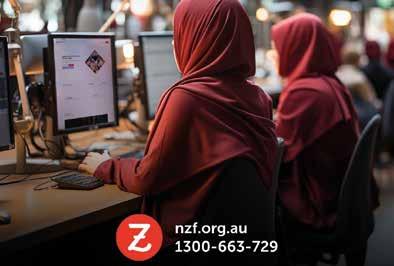
I believe we are more educated
What would that look like?
More workshops trying to target the younger generation because they are the future Zakat payers and recipients.
How can Zakat transform and empower not only individuals but also communities?
Empowering your Muslim brother or sister locally, in turn when they are back on their feet, they’re going to help the next individual like a domino effect.
Have you noticed any differences in the need of people applying for Zakat?
Yes, definitely within the last year with the cost of living. We’ve seen an increase in rental arrears and bills. Whereas before there were a lot of non-citizens like asylum seekers who didn’t have government financial support. Now we’re seeing citizens who are working and do get Centrelink applying as they have fallen behind in their financial obligations.
Did COVID-19 have any impact on the need for Zakat?
Yes, we saw an influx of asylum seekers and non-citizens because they didn’t get benefits of accessing COVID payments and relief.
Lastly, what more can we do as a community to support those that need Zakat?
I think we can do more outreach and education is very important, because donors and recipients may not know the importance of local Zakat according to the sunnah. Many clients don’t know how Zakat works.
Level 1, 157 Spring St, Melbourne 3000 9651 6701 JohnPesutto leader@opposition.vic.gov.au JohnPesutto.com.au
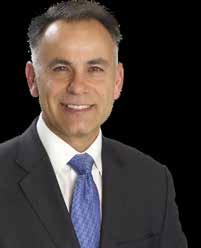
Authorised by John Pesutto MP, Level 1, 157 Spring Street, Melbourne 3000
link between young people’s sleep and physical and mental health
New research published today sheds light on the sleep health of young Australians, and how it relates to their physical and mental health, with 60 percent saying their sleep hours are irregular.
The study, published in the Australian and New Zealand Journal of Public Health, included 1,234 young adults from Western Australia’s Raine Study and is the first of its kind in Australia to comprehensively investigate sleep health in young adults.
The study showed a significant proportion of young people have suboptimal sleep, with 30 percent of young adults saying they slept less than seven to nine hours a night, and 18 percent taking more than 30 minutes to fall asleep. Sixty percent lacked regular sleep hours.
Researchers also found that many young people weren’t satisfied with their sleep, with 25 percent reporting that their sleep is “fairly bad” or “very bad”. Ten percent also reported having impaired daytime alertness.
Clinical psychologist and lead researcher Dr Alex Metse from the University of the Sunshine Coast was surprised to find that it was selfreported sleep satisfaction and daytime alertness which had the strongest relationship with young adults’ mental
and
“We hear a lot of messaging around the fact that as adults we need seven to nine hours’ sleep a night to be healthy – this study shows that it’s not that simple.
“Compared to young adults who were satisfied with their sleep, those who were dissatisfied with their sleep had mental health scores that were 34 percent lower and physical health scores that were seven percent lower.
“Physical and mental health scores were also lower for those who felt less alert during the day, and mental health scores were lower among those who slept less than the recommended duration in the sleep study.
“Previous studies have shown that poor sleep is associated with chronic health conditions such as depression and cardiovascular disease. As well as demonstrating how important sleep is to both physical and mental health by showing a clear link, this study helps us understand further the indicators of good sleep when it comes to our health.
“Sleep satisfaction is a subjective measure. This means there might also be opportunities to educate the public about what a “normal” night sleep looks like which might change expectations and in turn improve satisfaction and help young adults create healthy habits.


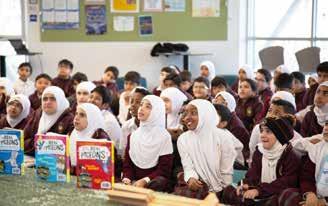


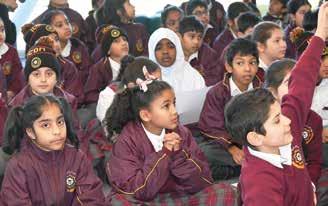
In celebration of Reading, ICOM held the annual Primary Literacy Week between the 19th – 22nd of June. Throughout the week, students were treated to a diverse range of activities that kept them thoroughly entertained; activities ranging from multiple storytelling sessions during recess and lunch, Interactive sessions, book stalls, cake and donut stalls, there was never a dull moment in the College.
Primary SRC students also had a stall selling books that were donated by students in order to buy new ones to donate to local childcares to nurture a love for reading from a young age.
Literacy Week served as a testament to the power of books and imagination in shaping young minds. The event fostered a love for reading and provided a avenue for students to express their creativity once again.
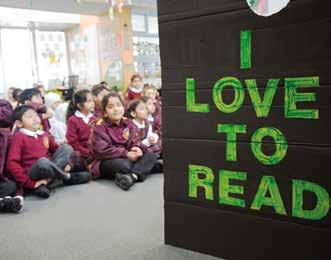

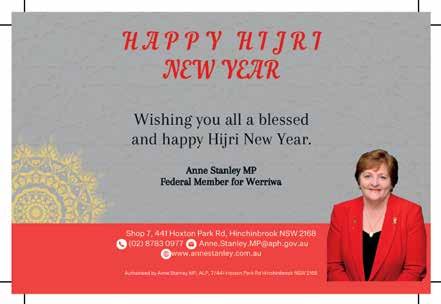 Steve McGhie MP Member for Melton
Steve McGhie MP Member for Melton
A: 3 Alexandra Street, Melton VIC 3337 Ph: (03) 9743 9825
E: stephen.mcghie@parliament.vic.gov.au

The Andrews Labor Government is introducing sweeping new reforms to protect Victorians from gambling harm –making the state’s gambling harm protections the strongest in Australia.
Premier Daniel Andrews and Minister for Casino, Gaming and Liquor Regulation Melissa Horne today announced new reforms to reduce gambling harm at venues with electronic gaming machines (EGMs) across the state.
An estimated 330,000 Victorians experience harm as a result of gambling each year – costing Victoria around $7 billion annually and leading to significant financial distress, mental health concerns and relationship issues.
All EGMs in Victoria will require mandatory pre-commitment limits and carded play, putting the power back into the hands of patrons while also ensuring that money is tracked – stopping money laundering through our gaming venues.
Load up limits – how much money an individual can put into an EGM at a time – will be capped at $100, down from the current limit of $1,000, helping people make informed decisions about their spending, change their behaviour and reduce the amount that can be lost.
Mandatory pre-commitment, carded play and load up limits will be introduced subject to thorough consultation with industry through an implementation working group – taking into account trials in other jurisdictions and the experience at Crown Melbourne, which will have mandated pre-commitment and carded play on all EGMs by the end of 2023.
By mid-2024, mandatory closure periods will be enforced for all gaming machine areas in a venue, except the casino, between
4am and 10am. This will address evidence showing some venues are implementing staggered opening hours to allow users to move between venues in one area to continue gambling.
The Government will also make it mandatory for all new EGMs to spin at a rate of three seconds per game, slowing the pace of the game down and limiting the amount that can be lost.
These combined reforms will keep pace with emerging technologies gaming machines are using, produce safer gambling environments and help patrons to take a break.
These reforms extend changes the Government introduced after the findings of the Royal Commission to other gaming venues across the state, building on nation-leading protections introduced at Crown and the establishment of the nation’s strongest regulator – the Victorian Gambling and Casino Control Commission (VGCCC).
This year’s Budget includes $71 million for the VGCCC to take on a larger role in gambling harm minimisation, taking over most of the functions of the Victorian Responsible Gambling Foundation from 1 July 2024.
Anyone affected by their own or someone else’s gambling can call Gambler’s Help 24/7 on 1800 858 858 to access confidential and free advice, support and referral.
“These reforms will provide the strongest gambling harm preventions and anti-money laundering measures in Australia – we owe it to all Victorians to take this stance and help those experiencing harm turn their lives around.”
“I look forward to the implementation working group’s
input and effort.”Premier Daniel Andrews said.
“Everyone loses when it comes to gambling harm, and it’s not confined to money – people lose their relationships, their jobs and their wellbeing.”
“Our previous reforms have
delivered stronger oversight of the gambling industry in Victoria with a regulator unafraid to hold venues to account – now we’re doing more important work to reduce gamblingrelated harm.”Minister for Casino, Gaming and Liquor Regulation Melissa Horne said.
Last weekend the 3rd annual African Festival was held at the Queen Victoria Markets in Melbourne.
The two-day event, sponsored by Smartraveller –the Australian Government’s portal for Australians planning and travelling overseas – saw around 10,000 people dance, eat and enjoy African culture. Assistant Minister for Foreign Affairs, Tim Watts, attended the event and remarked on the incredible sense of culture and community shown at the festival.
“The African Festival was a wonderful celebration of culture and diversity - with people of all backgrounds joining in the event”, said Assistant Minister Watts.

[The Assistant Minister may wish to include personal reflection on the event here]
“Events like these demonstrate Australia’s
diverse heritage, bringing together people from across the world.
“They’re also excellent avenues for travel inspiration and sparking that wanderlust.
“That’s where Smartraveller comes in. It helps Australians prepare and plan their trip, so they can make informed choices while overseas.”
Smartraveller provides advice on passports, visas and travel insurance through to detailed travel advice on over 175 destinations. It also offers essential resources in multiple languages.

Assistant Minister Watts encourages everyone to make Smartraveller.gov. au their first destination when planning their next adventure and subscribe for updates.
“Smartraveller is an essential part of planning an overseas trip, even if you’ve never travelled before, or travel regularly its important to stay-up-to date with the
latest information”, said Assistant Minister Watts.
Smartraveller’s top tips before you go overseas:
• Follow the local laws, which may be different to the laws in Australia.
• Respect the cultures and places of significance you visit. This includes wearing appropriate clothing at places such as temples.
• Be careful how you use social media overseas. In some countries posting revealing photos or commenting on local or political issues can get you in trouble.
• Keep your bags and belongings close – don’t leave them on the ground or the back of a seat. This gives thieves a perfect opportunity to steal them.
• If you’re hiring
equipment, such as jet skis or a quad bike, check it before you use it and if something seems off, ask for a replacement.
• Make sure you have the correct license for any equipment you hire.
• If you’re travelling solo, take extra precautions –use official transport and don’t advertise you’re travelling alone.
• Remember your travel insurance and read the fine print on your policy.
• Leave a copy of your itinerary and travel insurance with loved ones in Australia.
• If you don’t already have a passport allow six weeks to renew or apply.
For more information about Smartraveller and to access their travel advice available in-languages, please visit https:// www.smartraveller.gov. au/consular-services/ communities
Wishing success, peace and harmony to you and your family in the coming year.
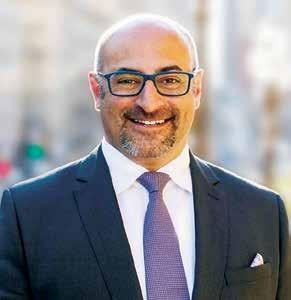
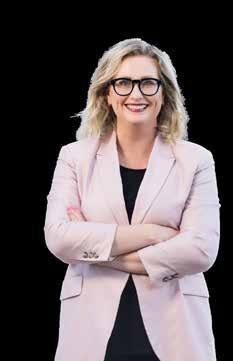
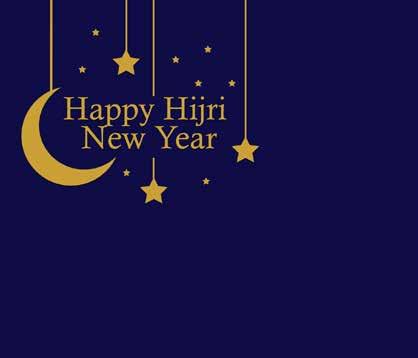
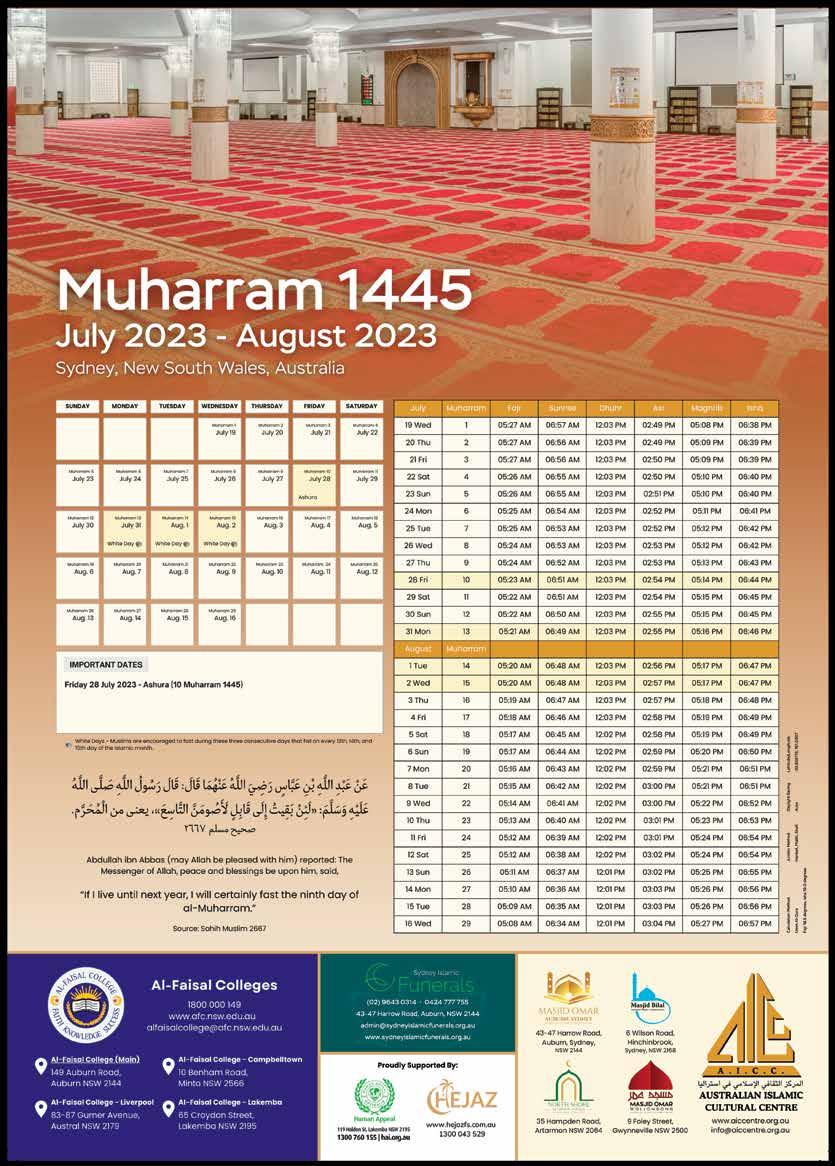
R U OK? research has underscored the impact a genuine conversation can have on someone who is struggling with life.
The research[“”#_ftn1””][1] found more than four in five people who engaged in a meaningful conversation felt better about managing their situation having talked it through and felt supported, heard, and safe during the conversation.
However, the research also found that when asked if they were OK, two in five people (38%) who said they were OK actually were not OK. These respondents told us that important factors to encourage an honest conversation are:
• Trust: they need to know the person they speak to is someone they trust, and, for many, someone they are close to
• Authenticity: they want to know the person asking them genuinely wants to hear answer
• Environment: people would prefer to have these conversations in a relatively private space with enough time to share what they want to say.
Two months out from R U OK? Day on 14 September 2023, R U OK? are calling on Australians to let the people they care about know; ‘I’m here to hear’, every day of the year.

“You need to ask this question because you mean it. If you really care and want to hear an honest answer, be genuine with your ask, make space to listen and let the person know you’re sticking around for whatever comes next,” said Katherine Newton, R U OK? CEO.
“We know the positive impact an R U OK? conversation have when people know and trust each other. This usually means that trust has been built over time, they’re familiar with each other’s routines and behaviours, and they likely know what’s going on in each other’s lives. This trust, along with consideration of the where and when a conversation will take place contributes to making an R U OK? conversation truly meaningful.”
Suicide Prevention Australia’s June 2023 Community Tracker[“”#_ftn2””][2] revealed 2 in 5 Australians know someone who has died by or attempted suicide in the last 12 months, a 13% increase from 2021. For the fourth quarter running, cost-of-living and personal debt remained the number one issue driving distress.
“In recent years there has been a lot for Australians to deal with. Many are still feeling the impact of natural disasters and the pandemic, while the costof-living increases are adding more stress on those who might already be struggling to manage,” said Ms Newton.
“There is a natural tendency for us to want to move on as new events capture focus and we resume our usual routines,” explained Ms Newton. “That’s why it’s important for us to recognise that the people we really care about may be feeling ongoing effects, long after something has happened to them, and to let them know we’re still here to really hear.”
R U OK? Community Ambassador, Anthony Gagliardi understands first-hand the importance of having an authentic conversation with someone close to you, who takes the time to take notice and really listen.
“Asking, ‘are you OK?’ in a genuine manner is so important to the outcome,” said Mr Gagliardi who when struggling with the physical impact of an ongoing chronic back injury didn’t realise the mental toll it was having on him until a friend spotted the signs that he might need support.
“I didn’t really know that I was going to answer ‘no’ (I wasn’t OK) at that point in time, but he sensed I was struggling, that something wasn’t quite right and asked me if I was OK,” said Mr Gagliardi. “Due to our relationship, there was a high level of trust and respect.
“It is about just being there, being able to listen, you’re not trying to fix the problem, that’s not the role,” he said. “It was that non-judgmental, really active listening, just letting me vent, letting me let go of everything that I was thinking and worried about.”
Mr Gagliardi’s experience reinforces the need to show genuine interest and concern when you ask someone, ‘are you OK?’ to encourage a meaningful conversation.
“Positive experiences revolve around feeling heard, validated, and receiving empathy,” said Ms Newton.
“By making the time and space for an R U OK? conversation and listening with an open mind, we can help the people in our world feel supported and, if needed, encourage them to access professional support long before they are in crisis.”
Let the people in your world know you’re here, to really hear, because a conversation could change a life.
You can find FREE resources at ruok.org.au to help you know when and how to ask, ‘Are you OK?’ in your workplace, school and community and plan your R U OK?Day 2023 activities.
For support at any time of day or night, Lifeline provides free and confidential crisis support. Call 13 11 14, text 0477 13 11 14 or chat online at: lifeline.org.au.
13YARN is a free 24/7 service offering crisis support for Aboriginal & Torres Strait Islander people. Call 13YARN (13 92 76).
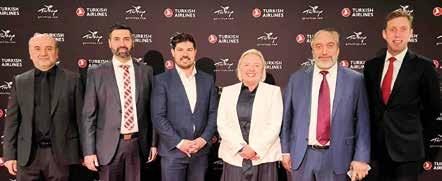
Prof. Dr. Ahmet Bolat, Chairman of the Board and the Executive Committee of Turkish Airlines, visited Australia to discuss the importance of Türkiye and Australia relations and the airline’s plans for the Australian aviation market.
The flag carrier brought together prominent figures from both the Australian and Turkish aviation sectors, along with representatives from national media and the business community to celebrate the milestone of non-stop flights being introduced to the Australian market and the burgeoning partnership between the two countries.
Taking center stage at Palladium at Crown Melbourne, Professor Dr. Ahmet Bolat shared his goal of connecting Australians to the airline that flies to more countries in the world, while promoting Türkiye’s culture and hospitality.

Hosted by Channel Seven’s Rebecca Maddern, the event featured prominent figures from Türkiye and Australia to celebrate the deepening relationship between the two countries. Among the esteemed guests included His Excellency Ufuk Gezer, Ambassador of Türkiye to Australia, the Honourable Ben Carroll, Minister for Public Transport of the State of Victoria, Chairman of Melbourne Airport, Peter Hay, CEO of Melbourne Airport, Lorie Argus and CEO of Visit Victoria Brendan McClements. Additionally, Nadia Fairfax-Wayne, Dr Matt Agnew, Karen Martini, Lorinska Merrington and Sharon Johal were also in attendance at the event.
Turkish Airlines’ Chairman of the Board and the Executive Committee, Prof. Dr. Ahmet Bolat said “Türkiye and Australia share a long-standing history of friendship. Our countries may be far apart but our people are very close in heart,
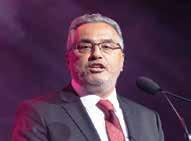
We have had our eyes on Australia for a really long time. The fact that our office in Sydney celebrates its 35th year alone is
a testament to Turkish Airlines’ desire to add Australia to our wide flight network.
The warmth of the Australian people, the large number of Turkish people that have made these lands their home, and the international vision as well as the Australian people’s desire to travel excite us at Turkish Airlines as we look to commence our flights to this beautiful country in the coming future.

We are eager to add Australia to our network and connect Australian people to the world with our award-winning service quality.
I am delighted to say that our planning is near its end and we will make an announcement in the upcoming months.”
Turkish Airlines carried 120,837 passengers in 2019 and 118,847 passengers in 2022 from Australia with the airlines which it has a codeshare agreement with.
Turkish Airlines presented a photographic exhibition “Connect” at the event to showcase the natural and historical wonders of Türkiye to Australian travelers.
The exhibition highlighted landscape photography from different regions of Türkiye and 49 cities, including the hidden gems of Anatolia, one of the oldest inhabited regions in the world, as well as revealing new perspectives on familiar destinations.
The distinguished guests also experienced a celebration of cultural phenomena from Türkiye including a showcase of Calligraphy Art and a 360 photo activity of the Göbeklitepe, the world’s oldest known megaliths. Attendees were also gifted a stunning Nazar Boncuk bracelet. Turkish people believe that the amulet on the bracelet protects its holder from the bad energies by absorbing them.
Last year, Turkish Airlines achieved remarkable success on a global scale by becoming the airline with the largest international seat capacity, and Istanbul became the busiest airport in Europe. With an unrivaled flight network, a young and modern fleet, comfortable seats and delicious treats, they have earned the title of the ‘Best Airline in Europe’ from Skytrax. The national flag carrier of Türkiye has been honored for the eighth time with the Best Airline in Europe award, along with accolades for Best Business Class Catering, Best Economy Class Catering, Best Airline in Southern Europe and Best Economy Class Seat in Europe at the Skytrax World Airline Awards.
Turkish Airlines was also recognised by the Association of Airline Passenger Experience (APEX), one of the most trusted and prominent aviation organisations in the world, awarded Five Star Global Airline, and World Class, the highest award category of APEX.
Turkish Airlines, one of the largest airlines in the world, hosts flights to over 300 destinations in more than 120 countries. The airline maintains its remarkable momentum and brand prestige as the aviation industry continues to rebound from the pandemic.

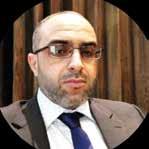
empowers people to take control of their financial situations and helps businesses to optimise their operations. As a whole, the FinTech industry is evolving, and as it is, it is promising to reshape the way we as a society save, invest, transact, and interact with financial institutions. In turn, this fosters a more accessible financial ecosystem. FinTech has had a significant impact on various areas of society, one of those areas is teenagers. Essentially, FinTech has revolutionised the strategies in which teenagers handle their money.
Financial technology, often referred to as FinTech, has revolutionised the way we manage our finances in today’s digital era. Offering innovative banking solutions to individuals and businesses alike. From mobile payment apps and digital wallets

financial services, making it more
One of the ways that FinTech has proved itself to be beneficial is by providing financial education to teenagers. This is done through various resources, such as online platforms, digital tools, and mobile apps. These resources help to teach young people about budgeting, saving, investing, and managing their own finances more efficiently.
Digital banking is also another way that young people have access to. It has become easier to manage bank accounts, make payments, and to track their transactions
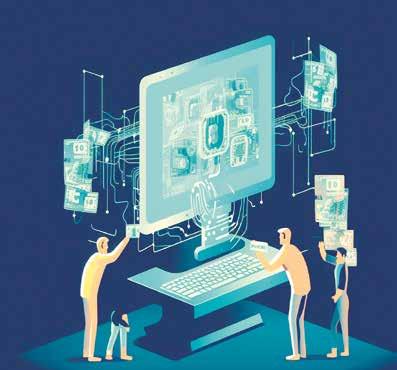
through mobile apps. In essence, this accessibility has made it easier for teenagers to make the right decisions when it comes to handling their money, developing healthier and responsible financial habits that will positively affect teenagers are they grow and develop.
Another important factor that has helped positively impact the lives



of young people is the opportunity of entrepreneurship. With the accessibility of the internet, online platforms such as Etsy, DePop, and Shopify to name a few. Young people learn important skills, whilst having the opportunity to network and make profit, therefore a step closer to financial independence.



قئارحلاو لزلازــلا مامأ تدمص
توريب نوكلأ تدمصو )انفلا(و )ابولا( مامأ
ةيبرغلا وأ ةيقرشلا توريب لا ،ةدحاولا

؟ةثراكلا عم نيلماعتتس فيك
نأ توريب اي يملعا ءيش لك لبقو لاوأ
كأطخأ امو كئطخيل نكي مل كباصأ ام
ارمأ هللا يضقيل( اذكهو ،كبيصيل نكي مل
)نوملعي لا سانلا رثكأ( نكلو )لاوعفم ناك
مهو ايندلا ةايحلا نم ارهاظ نوملعي( مهنلأ
يعيضتلا ،نذإف )نولفاغ مه ةرخلآا نع
يركف

ICCV is the largest Halal certification organisation in Australia servicing clients locally and internationally.

ICCV is responsible for the certification, monitoring, and supervision of Halal food for the domestic market as well as the export market.
Clients cover a range of sectors including abattoirs, food processing businesses, transportation and cold storage operators.
We are the largest halal certification body in Australia. Professional, experienced and trusted.
We work with abattoirs to get and keep their halal certification.
ICCV is specifically accredited within these Muslim majority countries. Our certification is approved for all halal importing countries.
We monitor the certified businesses for compliance of halal requirements.
We provide a means for direct supervision in house for quality assurance.
We provide full turnkey solution for FGMs to get halal.
Malaysia, Indonesia, Singapore, The Kingdom of Saudi Arabia, Brunei, Oman, Kingdom of Bahrain,Tunisia,Yemen, Syria, Jordan, Lebanon, Kuwait, Libya, Qatar, Afghanistan, Albania, Bangladesh, Bosnia, Iran, Kosova, Morocco, Maldives.
We provide logistics companies for cold room and transport to get halal.
Our certificate is approved in countries that now require halal certificate if goods have halal stamps:
Canada, South Korea, China, European Union (EU), New Zealand, Russia Federation, Sri Lanka, United Kingdom, United States of America (USA).
Around 8 million Australians will benefit from a game-changing new approach to stopping cardiovascular disease (CVD) before it strikes.
Health and Aged Care Minister Mark Butler today launched the country’s new Cardiovascular Disease Prevention Guideline and accompanying CVD Risk Calculator – a ‘tool kit’ that sets improved clinical standards for the prevention of cardiovascular disease before it takes hold.

The new Guideline and calculator were developed by the National Heart Foundation of Australia on behalf of the Australian Chronic Disease Prevention Alliance (ACDPA), represented in this project by Diabetes Australia, Kidney Health Australia, and the National Stroke Foundation.
Both the Guideline and calculator will equip GPs, nurses and healthcare practitioners with the best tools yet for preventing cardiovascular disease in the 8 million Australians who do not have a CVD diagnosis.
Updated CVD Risk Calculator a powerful new tool
One of the highlights of the new Guideline is the new Australian CVD Risk Calculator, calibrated specifically for the Australian population.
The updated algorithm replaces one that was based on a town in the United States more than 60 years ago.
The new calculator will help clinicians to more accurately predict cardiovascular disease in all people living in Australia.
Other important updates to the Guideline include updated risk categories, improved guidance on how to communicate CVD risk to patients, specific considerations for First Nations peoples who experience heart disease at higher rates than non-Indigenous Australians, and the inclusion of female specific risk factors.
Roll-out to now commence Today’s reveal now paves the way for the Heart Foundation to begin

rolling-out the Guideline to clinicians to ensure Australians have access to the best quality CVD Risk Prevention as soon as possible. A campaign promoting the Guideline to clinicians is now underway.
For more information about the Guideline please visit the dedicated website:


www.cvdcheck.org.au


“The new Australian CVD Prevention Guideline is a tool kit for doctors, nurses and other healthcare workers to more accurately predict and prevent cardiovascular disease in as many as 8 million Australians.
“Many years from now we will look back on this day and note that the new Guideline was a major turning point in saving many Australians from cardiovascular disease.
“We thank the Australian Government for their support and leadership on preventative heart health, having funded the development of this Guideline and supported the Heart Foundation with its implementation, and having also extended the Medicare Heart Health
Checks.” David Lloyd, CEO, National Heart Foundation said.


“The updated CVD Prevention Guideline and Calculator will spark important conversations between Australian health care professionals and patients about improving health and preventing chronic conditions including those closely linked to cardiovascular health, particularly heart and kidney diseases, stroke, and diabetes.
“Many of the actions recommended to reduce CVD risk have wider health benefits; for example, healthier diets, more physical activity, limiting alcohol and not smoking also help to reduce the risk and impact of several cancers, lung disease, and other chronic conditions. With up to 40% of chronic disease burden preventable, helping people to better understand and manage factors contributing to chronic illness is essential for longer and healthier lives.”Lucy Westerman, Executive Officer, Australian Chronic Disease Prevention Alliance said.
massaging the egos of the rich. Its messages affirm “…. the religious and spiritual legitimacy of wealth accumulation and reinforce a worldview in which financial success is an indicator of moral soundness.”
[Religion and Public Life Harvard Divinity School]
The undeserving poor
The idea that prosperity and goodness are linked, goes with the notion of the undeserving poor.
James the brother of Jesus (p) in his epistle wrote: “Now listen, you rich people, weep and wail because of the misery that is coming on you. Your wealth has rotted, and moths have eaten your clothes. Your gold and silver are corroded. Their corrosion will testify against you and eat your flesh like fire.” [James 5:1-6 ]
In The Gospel according to Matthew it is written: “And the King will answer them, ‘Truly, I say to you, as you did it to one of the least of these my brothers, you did it to me.’ “[25:40]
assistance from departmental staff, by clawing back benefits whether justly or not, and by generally making the condition of the social security recipient unpleasant and undesirable. The Robodebt scheme exemplifies the latter.”
This encapsulates the approach for a decade under the LNP AbbottTurnbull-Morrison government and it has become part of the culture in Centrelink.
If you have been forced to contact Centrelink in the past decade or so, you would be aware of how unwelcoming and difficult it is to deal with.
The phone is left ringing until you give up and when a visit to the office is necessary, queues and waiting for lengthy periods is the experience.
The staff are overstretched and try to be helpful but the whole Centrelink enterprise is underfunded and poorly administered at the top. It has been poorly served by a string of ministers who we hope are included in the sealed section of the Robodebt Royal Commission Report.
The assumption, which seems to have been passed down from Victorian England, is that you are trying to get something for nothing.
This old fashioned approach to welfare has been revived by the spread of the insidious tumour of the “prosperity gospel” or the “health and wealth gospel,” from a Pentecostal base in the USA.
It is not a mainstream Christian approach and an American Christian website, the Gospel Coalition, analyses this arrogant attitude.
“In the forefront is the doctrine of the assurance of “divine” physical health and prosperity through faith. In short, this means that “health and wealth” are the automatic divine right of all Bible-believing Christians and may be procreated by faith as part of the package of salvation, since the Atonement of Christ includes not just the removal of sin, but also the removal of sickness and poverty.” [3 May 2017 Joe Carter The Gospel Coalition]
This attracted many of the impoverished, offering an illusory path to prosperity while also
“Poverty researchers and activists have to battle against an ideological tide which insists that if you are in poverty, it is either your own fault for not trying hard enough to get a job, or for failing to acquire the skills that would qualify you for a better-paid job.”
That goes with the old Tory idea that the poor have no claim to support.
“And if it is no one’s fault but your own, you have no justified claims against others or the state. At most, we might give assistance out of the goodness of our hearts, but there are no claims of right or justice.”
By 2023 all but the deluded understand poverty is linked to “the state of the economy, government policy regarding minimum wage, unemployment benefits, housing support, income support, and the provision of public services.” [J Wolff 22 November 2019 New Statesman]

Unfortunately, the notion of the undeserving poor is not limited to the more excited of the evangelicals. Even the former Archbishop of Canterbury, Lord Carey, attacked his fellow bishops for resisting cutting back on the welfare system. [27 January 2012 Guardian]
Mainstream Islam, Christianity and the Hebrew Bible have a very different interpretation.
Abu Darda reported: The Prophet Muhammad (p) said, “Seek out the vulnerable for me, for you are only given provision and divine support due to your care for the vulnerable.”
[Sunan Abi Dawud 2594]
This attitude still exists as a 2019 survey of American Muslims indicated. They are significantly more likely than the general public to believe that poverty is primarily due to circumstances beyond one’s control vs. an individual’s bad choices. [26 November 2019 Institute for Policy and Understanding]
The Torah records: “If among you, one of your brothers should become poor, in any of your towns within your land that the LORD your God is giving you, you shall not harden your heart or shut your hand against your poor brother, but you shall open your hand to him and lend him sufficient for his need, whatever it may be. [Deuteronomy 15:7-8]
The Robodebt Royal Commission Report
Commissioner Catherine Holmes, SC was scathing in her report to the government.
She spoke truth to power.
“Politicians need to lead a change in social attitudes to people receiving welfare payments.”
“The evidence before the commission was that fraud in the welfare system was minuscule, but that is not the impression one would get from what ministers responsible for social security payments have said over the years.”
“Anti-welfare rhetoric is easy populism, useful for campaign purposes.”
Discussing the possible approaches to welfare, she hit the nail on the head.
One approach is to understand that at times people will need temporary support in difficult situations and that is provided with respect for their dignity.
“An alternative approach is to regard those in receipt of social security benefits as a drag on the national economy, an entry on the debit side of the budget to be reduced by any means available: by casting recipients as a burden on the taxpayer, by making onerous requirements of those who are claiming or have claimed benefit, by minimising the availability of
Some 443,000 Australians received false and illegal Robodebt notices. The ABC placed several of their stories online under Robodebt case studies. [8 July 2023 ABC News].
Triple J Hack claimed in 2019, according to data released by the Department of Human Services, that more than 2030 people died after receiving a Centrelink Robodebt notice.
“Of those, 429 - roughly one-fifth - were aged under 35. The figures cover a period from July 2016 to October 2018.” [18 February 2019 ABC Triple J]
The report is online at https:// robodebt.royalcommission.gov.au/ publications/report
As Laura Tingle commented: “You don’t have to read the sealed section of the report to know that lot of people are going to face some dire consequences as a result of their actions.” [8 July 2023 ABC News]
The spread in some Christian circles of the prosperity gospel, combined with traditional Tory values of serve the rich and belabour the poor, has extended the life of the mindset, still embedded in so many of our institutions, that welfare is something bad and should not be required if people were more responsible.
The same people usually oppose unions of working people, fight wage increases and oppose equitable taxation, opting in the main for indirect tax which is a burden on the poor and the removal of regulations which they call “red tape.”
Robodebt and its accompanying distress for welfare recipients and hopefully for those corrupt politicians and public servants who now face prosecution, should mark a watershed in official attitudes to those citizens who may at times require welfare support.




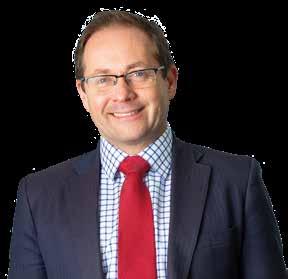



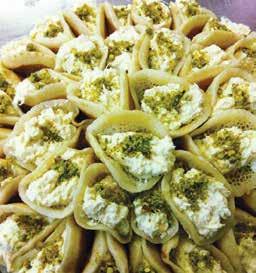



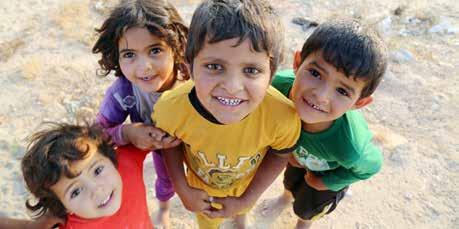 By Jamilah Samian www.coolmumsuperdad.com
By Jamilah Samian www.coolmumsuperdad.com
Empathy is a fundamental human quality that allows us to understand and share the feelings of others. By cultivating empathy in young children and teenagers, we can shape them into compassionate and kind individuals who are sensitive to the needs and experiences of others. Story-telling serves as a powerful tool in fostering empathy, as it allows young minds to engage with different perspectives, emotions, and experiences. In this article, we will explore the profound impact of story-telling on empathy development and provide practical tips to effectively use storytelling to nurture empathy in young children and teenagers.
Story-telling has been an integral part of human culture since ancient times. It captivates our imagination and allows us to connect with characters and their journeys. When it comes to cultivating empathy, stories play a significant role by enabling children and teenagers to experience different perspectives and emotions. Through story-telling, young minds can explore the lives of diverse characters, understand their challenges, and empathize with their joys and sorrows.
Stories provide a safe space for children and teenagers to encounter unfamiliar situations and emotions. They allow individuals to step into
the shoes of characters, offering a window into their thoughts and feelings. As young readers or listeners become emotionally invested in the narrative, they develop a sense of connection and empathy towards the characters. This emotional engagement helps them build bridges of understanding, broadening their worldview and nurturing empathy in the process.
Choose Empathy-Centric Stories: Select stories that focus on themes of kindness, compassion, and understanding. Look for narratives that feature characters from diverse backgrounds, cultures, and experiences. These stories help young children develop an appreciation for differences and understand the importance of treating others with empathy.
Encourage Emotional Exploration: Engage children in discussions about the emotions experienced by the characters in the stories. Ask openended questions to prompt them to reflect on how the characters might be feeling and why. This practice helps children understand and relate to the emotions of others, fostering empathy and emotional intelligence.
Highlight Moral Dilemmas: Introduce stories that present moral dilemmas or conflicts that require empathy and
compassion to resolve. Discuss these situations with children, encouraging them to consider different perspectives and brainstorm solutions that prioritize kindness and understanding.
Practice Perspective-Taking: Encourage young children to imagine themselves in the shoes of the characters. Ask questions like, “How would you feel if you were in that situation?” or “What would you do if you were the main character?” This exercise promotes perspective-taking skills and enhances empathy by encouraging children to think beyond their own experiences.
Encourage Critical Analysis: Introduce teenagers to stories that explore complex social issues, ethical dilemmas, and diverse perspectives. Engage in discussions about these narratives, encouraging critical thinking and reflection. This process helps teenagers develop a broader understanding of the world and fosters empathy towards others. Volunteer and Community Engagement: Encourage teenagers to participate in volunteer work and community engagement activities. These experiences provide opportunities to interact with individuals from diverse backgrounds and develop empathy through
meaningful connections and service.
Promote Digital Empathy: In today’s digital age, teach teenagers about responsible online behaviour and the impact of their words and actions on others. Encourage them to practice empathy when communicating online, promoting respect and understanding.
To conclude, story-telling serves as a powerful tool for cultivating empathy in young children and teenagers. By carefully selecting stories, encouraging emotional exploration, and practicing perspective-taking, we can help young minds develop a deep sense of empathy and compassion, fostering a kinder and more understanding future for all. Storytelling offers a powerful tool to ignite empathy by allowing children and teenagers to engage with characters and explore diverse perspectives and emotions. By incorporating the tips discussed in this article, parents, educators, and caregivers can help nurture empathy in young minds. Let us empower the next generation with the ability to understand, respect, and empathize with others, creating a more compassionate and kinder society.
Jamilah Samian is the author of “Raise Me Right”, “Cool Mum Super Dad”, “Cool Boys Super Sons”, “The Kindness Miracle”, “Leadership In Parenting”, “77 Power Parent Tips”, “Parenting Generation Y & Z”.
The Pacific has become a battleground for soft power competition between Beijing and Canberra (and allies). China, through the Belt and Road Initiative (BRI), increased its investments in the Pacific by 400% from 2013 to 2018, signing up all the Pacific Island Countries (PICs), including Papua New Guinea (PNG), to the mega infrastructure initiative. Australia, after “losing” a lot of its old backyard friends to China, has rolled out several “counter” initiatives, including the Australian Infrastructure Financing Facility for the Pacific (AIFFP). How is it going for Australia?
Moresby; the USD $902 million Ramu 2 Hydropower Plant (Ramu 2); and Western Pacific University (WPU), in the country’s Southern Highlands province.

Centuries ago, Napoleon was quoted as saying, “Let China Sleep, for when she wakes, she will shake the world.” In Chinese President Xi’s words, “We should be forwardlooking, move ahead, and reject practices of discrimination and exclusion of others.” This quote resonates with the “China Dream”. China has embarked on a mission to exert more influence on the global stage.
In the Pacific, China increased its investment in the region by 400 percent, from $900 million in 2013 to $4.5 billion in 2018.
President Xi visited Moresby in November 2018, just ahead of the Asia-Pacific Economic Cooperation (APEC) summit, making it the first official presidential visit by a topmost PRC leader. That same year, Papua New Guinea (PNG) became the first PIC to join China’s mega infrastructure project, BRI. The initiative aims to build connectivity and cooperation across six main economic corridors encompassing China and: Mongolia, Russia; Eurasian countries; Central and West Asia; Pakistan; other countries of the Indian sub-continent; and Indochina.
As of 2022, the cumulative BRI engagement amounts to USD 962 billion, and a membership of 149 countries, 25 of which are from East Asia and the Pacific (including China).
In PNG, for example, the BRI has funded four mega projects: the PMIZ, a USD $156 million mega fisheries project that aims to retain Pacificcaught tuna for local processing; the KSCN, a USD $270 million underwater optic cable linking 14 coastal provinces to the capital, Port
In the Solomon Islands, this year’s Pacific Games will happen in the Chinese-funded and built stadium. However, it seems like China is up to something more. After the stadium aid, Beijing and Honiara made news when they signed a security pact in March 2022. The Solomon Islands are so inclined towards China. In 2020, leaked documents revealed the country was discussing a $100 billion loan from a Chinese businessman. To put this into context, this loan amount would be 77 times bigger than the Island country’s Gross Domestic Product (GDP).
First things first, the security agreement between the Solomon Islands and China attracted Western attention, leading to several highlevel diplomatic visits to Honiara, including a visit by Japan’s Foreign Minister, President Joe Biden’s IndoPacific Coordinator, Kurt Campbell, and Australia’s Foreign Minister, Penny Wong. The United States said it would “respond accordingly” if the security pact Honiara and Beijing signed led to a Chinese military presence in the Pacific. However, the Solomon Islands seem to be growing horns after they again signed a police cooperation deal with Beijing. Canberra asked the two parties to ‘immediately’ publish the policing deal.
Although Australia is a prominent aid donor to the PICs, Canberra is now rethinking its development approach in the Pacific. In 2018, Australia rolled out the Australian Infrastructure Financing Facility
for the Pacific (AIFFP) to provide loan and grant financing to Pacific island countries and Timor-Leste. According to the AIFFP website, Australia is partnering with the Government of Papua New Guinea to finance an AUD621.4 million investment to upgrade and refurbish selected Papua New Guinea’s (PNG) ports. After neglecting PICs’ climate plight for a long time, the Australian Government, through the AIFFP, is now investing in climate infrastructure through the Pacific Climate Infrastructure Financing Partnership (PCIFP). Under this new arrangement, Australia has contributed AUD32.4 million to the Tina River Hydropower Development Project in the Solomon Islands. Since World War II, Australia has squandered the chance to build deep and enduring relations with its neighbors in the South Pacific. However, recently, Australia has not only rejected BRI penetration in its territories but has responded with concrete infrastructure finance projects for PNG and the broader PICs. The rise of China as the top infrastructure investor in the Pacific region in recent years has worried traditional “partners” of the region, including Australia and New Zealand. I argue that the ‘neglect’ of the region after World War II left a vacuum that China was quick to fill. It will take a while for Australia to catch up with China, but it is not impossible. Australia, compared to China, has a deeper and better understanding of the socio-cultural, economic, and political dynamics of the region. Australia’s quality of projects has also gone without question. China is scaling down on the volume of BRI projects, not just in the PICs but globally, creating a ‘second chance’ for Australia. PICs have options and could greatly benefit from the competition between and among the big powers.
About the author:
Joel Odota is pursuing a master’s in international relations at the Australian National University. He holds a master’s degree (with thesis) in Politics and International Relations from the Yenching Academy of Peking University, Beijing. Joel also worked as a teaching assistant at the same academy for two semesters, where he was recognized as one of the Academy’s best Teaching Assistants of the 2018-2019 academic year. Joel is also the Yenching Academy Alumni Secretary for Africa and the founding member of the ChinaUganda Network Chapter, funded by the Ford Foundation through the Chinese in Africa and Africans in China (CAAC) Research Network. He is very passionate about ChinaAfrica relations in the context of the Belt and Road Initiative context. He has attended numerous conferences in that area, including at the Stanford University FACES Center, The European University Institute’s Robert Schuman Center for Advanced Studies, the Young Belt and Road Forum, the Chengdu Youth Federation, the Bai Xian Asia Institute, the Yenching Global Symposium, and the Yenching Social Innovation Forum, among others. Between 2021 and 2022, Joel and his colleague won a grant from the United States Institute of Peace (USIP) to research Chinese infrastructure in Uganda and its connection with peace and security. Their research focused on Uganda’s Kampala-Entebbe Expressway and the Entebbe International Airport Expansion projects, funded and implemented by China through Exim Bank and China Communication Construction Company (CCCC).
Interested in contacting the author? Email him at joelodota@ pku.edu.cn / joelodota@gmail.com
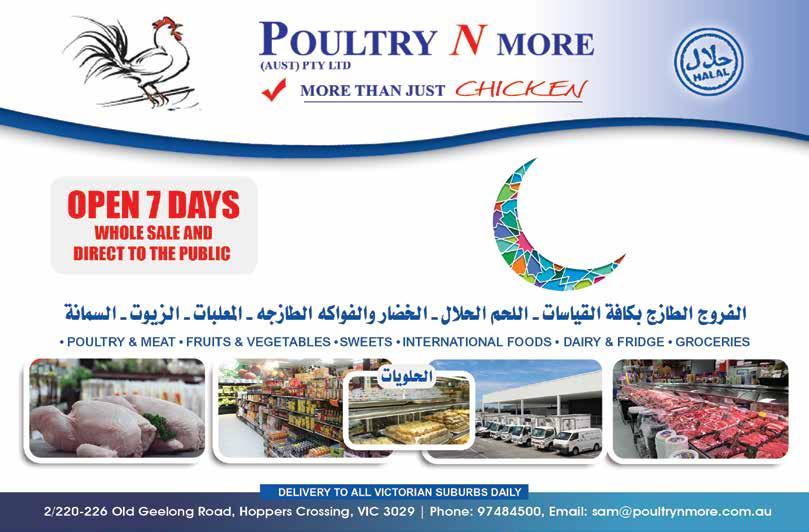

Early detection is key – bowel screening is a free and easy way to detect early signs of bowel cancer
The Australian Government has announced it is partnering with Cancer Council Australia to deliver a national campaign to increase participation in the National Bowel Cancer Screening Program (NBCSP).
Given bowel cancer can develop in both men and women with no symptoms or family history of cancer, the Australian Government, together with Cancer Council Australia, are encouraging all Australians aged 50 - 74, including those in Arabicspeaking communities, to do the free bowel screening test they receive in the mail every two years.
“We know cancer screening saves lives – and not screening costs us lives. The Government is proud to invest in this campaign with the Cancer Council to encourage more Australians to do their free bowel cancer screening,” said Mark Butler, the Federal Minister for Health and Aged Care.
“I’ve done the bowel screening test myself, and I encourage every Australian who receives the free test in the mail to also get to it,” Minister Butler said.
Minister Butler added, “please put the test somewhere like the bathroom as a reminder. Doing the test as soon as you get it could save your life.”
Cancer Council Australia CEO, Professor Tanya Buchanan, also noted that taking part in bowel cancer screening gives you the best chance of a long and healthy life with your family.
“Bowel cancer is Australia’s second biggest cancer killer, yet 90% of bowel cancer cases can be successfully treated if detected early.” Professor Buchanan said.
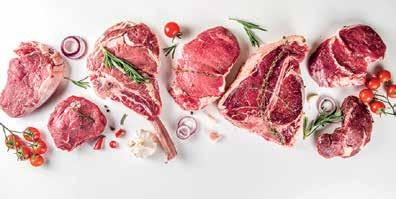
“The bowel cancer screening test is
a free and easy way to detect early signs of bowel cancer for people aged 50-74.” Professor Buchanan said.
To help encourage more Arabicspeakers to take part in regular bowel screening, the Australian Government and Cancer Council Australia have developed a range of in-language resources for Arabic speakers about bowel screening.
68-year-old Mr. Omar Osman did the easy at-home test to give himself peace of mind.
“I came across an article about bowel cancer screening and realised I had a screening kit at home. Taking the initiative, I completed the simple and quick test. The results brought me reassurance. This experience highlighted the importance of taking control of my health through screening. It’s empowering to know that doing the test can bring peace of mind.” Mr. Omar Osman said. The campaign reflects research about the unique needs of Arabic speaking communities in Australia when it comes to bowel screening, as well as data that suggests people within Arabic-speaking communities may screen at lower rates than the national average. By providing culturally sensitive and relevant resources and support, the program aims to empower Arabic speaking Australians to take proactive steps towards their health and well-being.
For more information about bowel screening in Arabic, visit http:// www.bowelcancer.org.au/arabic or speak to your family doctor or health professional about the National Bowel Cancer Screening Program. To speak to someone over the phone in Arabic, contact the Translating and Interpreting Service on 13 14 50 and ask to speak to the National Cancer Screening Register.
The Islamic new year, or the Hijri new year, marks the start of the Muslim lunar calendar.
Running for 354 or 355 days, it is approximately 11 days shorter than the solar, Gregorian calendar. The year has 12 months beginning with Muharram, and ending with Dhul al-Hijjah. Each month starts with the sighting of the new moon.
The Islamic new year starts with the migration, also known as the Hijrah, of Prophet Muhammad and his companions from Mecca to Medina in 622 AD, after they were repeatedly persecuted and threatened.
The Hijrah, considered one the most important events is Islamic history was chosen as the starting point for the calendar in 639 AD by Umar ibn al-Khattab, the second caliph.



